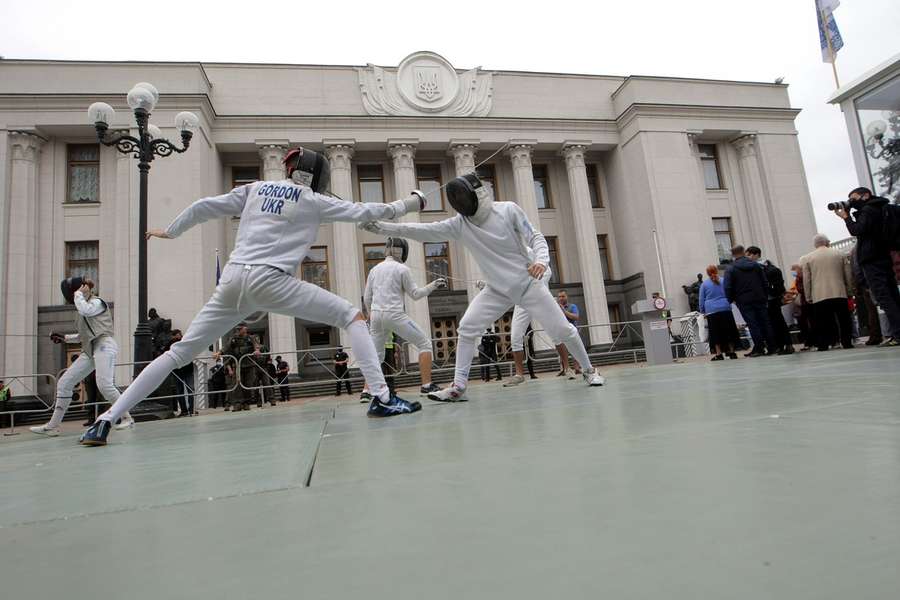Ukrainian fencers training for Paris Games ready to boycott Olympics

"It was a really shocking decision for all fencing family because nothing changed since the war started," Svitlana Sopit told AFP.
"People in my country die every day," she said. "Militaries fighting for our freedom. We will not compete against Russians. They should not take part because it is unfair and impossible in a civilised world."
Ukraine's women's foil team, scattered across Europe since the Russian invasion, assembled for a week at INSEP, the French national elite sport training centre in the Bois de Vincennes in Paris.
Even the harsh ceiling lighting and overheated fencing gym were a welcome change for Alina Poloziuk, who has been training in a war zone.
"I come from Mykolaiv in the south of the country. It was bombed today by Russians," the 20-year-old, a bronze medallist at the Turin Grand Prix in February, told AFP on Thursday in hesitant English.
"I am tired to talk about the war," she said. "I think about it a lot. But the first goal is to prepare for the competition. It is actually a good distraction, I think."
While Poloziuk and national coach Olga Leleiko stayed in Ukraine, others went into exile.
Twin sisters Olga and Svitlana Sopit moved to Bourg-la-Reine, in the suburbs of Paris.
"The athletes who stay in Ukraine live in really hard conditions for training but they never stop. No electricity, no heating but they continue to work," said Svitlana Sopit.
Her sister Olga said they have gone home to fence.
"We still compete sometimes in Ukraine," said Olga Sopit. "We start to fence, hear the alarm, hold for a second, go to the shelter, wait for three hours, then you come out, fence again. At some moment, the lights turn off. You wait another two hours. Competition can last 11 to 12 hours."
The twins left on the third day of the war, February 26, 2022, to participate in the European Junior Championships. Svitlana said they drove 77 hours to reach Novi Sad, Serbia. They did not set foot again in Ukraine for five months.
"My life was changed, we changed so many countries, so many homes," said Olga. "Finally after 32 flights, we arrived in France."
'Much more important than sports'
"It is quite difficult to be in these conditions and then you realise, this is the life, you can adapt and can live."
Fencing is the sport in which IOC president Thomas Bach won his Olympic medal. The International Fencing Federation (FIE) has an interim president, Emmanuel Katsiadakis, because Russian oligarch Alisher Usmanov stood down after the invasion of Ukraine.
In March, it became the first Olympic sport to invite Russians and Belarusians back into competition. FIE said they needed to make a decision before qualifying for the Paris Games started.
While Poland and Germany responded by cancelling fencing events, Russians and Belarusians are due to return to World Cup competition in foil in Plovdiv, Bulgaria, on May 5.
The Ukrainian authorities have banned their athletes from participating if Russians or Belarusians are present.
"Russians only get to fence individually," said 21-year-old fencer Dariia Myroniuk. "So for team competition, we still have a chance."
Ukraine's women's foil team are seventh in Europe and must climb to fourth to qualify to compete a few kilometres down the road at the Grand Palais in Paris in 2024.
"We just hope that other countries will support us," said Leleiko. "That they are not going to fence against Russians, that they will boycott. We also hope that the International Olympic Committee will not allow them to fence at the Olympics."
The fencers accept that they could jeopardise their chances of competing in the Olympics.
"We keep working, we never stop because we believe in fair decision," said Svitlana Sopit.
But she added: "There are things much more important than sports competitions."

